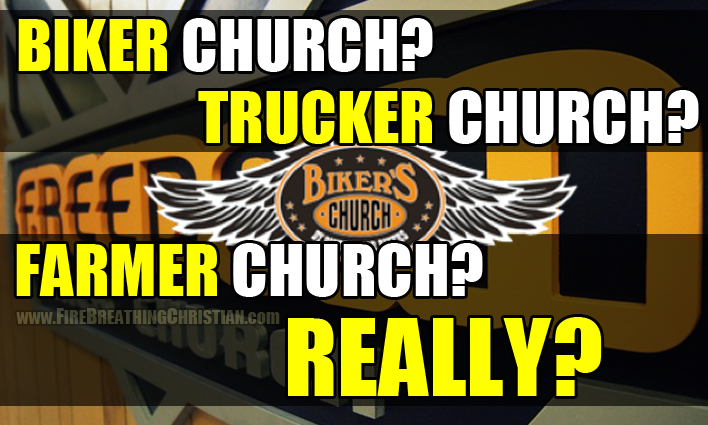
What’s in a church name?
A lot.
Even when it’s a little.
Because even a little says a lot…especially when what precious little is said centers on peripheral personal preferences rather than biblically sound distinctives.
How should a local church name itself? How should a local church present itself to the world?
Is what we’re given in Scripture enough to guide us on these things? (Hint: This is a trick question, the answer to which is always “yes”.)
Or is something more than Scripture needed when it comes to church naming and branding…like some sort of modern, “real world” marketable hook that appeals to unbelievers right here and now in 2016 America?
Put another way, should a church market itself in ways keying on things not at all referenced (much less recommended) as focal points for local church identification in Scripture?
In Abortion Abolition is Not the Gospel, posted back in March of 2014, Tony Miano made some good points on this subject, including:
“A church built upon a cause, philosophy, movement, or even a specific social demographic is unhealthy.
• A church for homeschoolers is unhealthy.
• A church for cowboys is unhealthy.
• A church for one generation or another is unhealthy.
• A church for first responders is unhealthy.
• A church for military personnel is unhealthy.
• A church for the rich or for the poor is unhealthy.
• A church for open-air preachers is unhealthy.
• A church for abortion abolitionists is unhealthy.
Likewise, a cause or philosophy of ministry, or movement built upon anything but Jesus Christ and the furtherance of His gospel is unhealthy. It is not only unhealthy. It is destined to fail.”
The point being made here is very important…and explains much as to why we have a gajillion churches dotting the American landscape, many of which are filled with enthusiastic members, even as the American culture goes to hell on a rocket.
We have churches and churches and more churches built upon business models and marketing strategies that have everything to do with appealing to the world rather than appealing (and building upon) the perfect, sufficient Word of God as the basis upon which we do everything, including naming and marketing our local churches (see: 2 Timothy 3:16-17).
This is why we have rocker churches and biker churches and cowboy churches and trucker churches built around rocker, biker, cowboy and trucker themes. We also have churches that center or self-identify primarily around specific issues or areas of life, like homeschooling (or, better put: home education).
Is home education an awesome and important thing?
Yep. It sure is.
Is a Christ-centered approach to children’s education an essential part of a coherent biblical worldview and life in practice?
Yessiree.
Even so, home education is a terrible thing to build a local church identity around. The same goes for other important and valuable approaches to family and church life like family integration in worship/teaching/learning (in contrast to the currently popular approach that embraces secular concepts like age-segregation, splitting families up into various groups and “ministries” shortly after they arrive at the “church” building).
Christ-centered home education and family integration in learning and worship are wonderful aspects of a vibrant biblical worldview in practice, but they cannot be the primary point upon which a church identifies and markets itself to the world. These fruits of Christian life in practice are not the centerpiece of the Christian life. Christ is that centerpiece. Presenting a local church as a beacon of Christ-centered children’s home education and family integrated worship is a beautiful thing, so long as those beautiful fruits of a Christ-centered life do not be come The Things that are used to define the local church body in question.
It’s in this context that Tony Miano’s “church for homeschoolers is unhealthy” line is right on and should be taken to heart.
And if a church “for homeschoolers” in that way is problematic (and it is), even though Christ-centered home education is such a beautiful and biblically sound thing, then what of the, um, infinitely less important things that churches are building their identities around and using to market themselves with these days?
What about personal preferences for a particular vibe, theme, or aesthetic, like rocker stuff or hipster stuff or yuppie stuff or Millennial stuff?
When the first word in a church name is something like “rocker” or “trucker”, what exactly is being conveyed?
Well, one thing that is being conveyed is importance.
If this rocker/biker/cowboy/trucker tag is the thing that we want for you to know about us first, then it is of exceptional significance to us. Any way you slice it, the fact that we have purposefully chosen to say this thing about us first makes plain that this thing is very, very important to us. It is dear to our hearts. It is central to our identity.
There’s no way around that.
The name of a church, when it centers on something preferential (as opposed to something like a literal physical/geographic reality, like “the church in Ephesus” or “the church in Chicago”) is the first part of that church’s theology that the church in question wants a watching world to know about it. It’s the church’s first chosen distinctive.
So one thing we’re generally communicating through our church name is what makes us different or distinct from other churches that do not have the same thing(s) in their names.
This seems obvious enough.
As such, things like rocker churches and cowboy churches are choosing to distinguish themselves along preferred themes and aesthetic understandings. Again, this much is obvious.
It’s in this context that we should recognize that when a group gets together to kick off a new church and decides that the first thing it wants to convey to the world in its name is “trucker” or “biker” or “farmer” or whatever, the group in question is making a theological statement. The church planting group is saying that this thing – this “rocker” or “trucker” or Star Wars thing – is what their church is about, at least in some significant sense (as in: significant enough to have the church’s name begin with that thing).
We’re about this vibe.
We’re about this aesthetic preference.
We’re about this theme.
This theme is “a thing” for us, so much so that it’s the first thing we want you to know about us…which leads us to the next thing that is being communicated in this approach to church naming (and branding), however unintentionally, that being: If our thing (you know, the thing we chose to share first with you about us in the way we identify and market ourselves) isn’t your thing – if our vibe and aesthetic of choice isn’t your vibe and aesthetic of choice – then this might not be the best place for you.
If you’re not remotely into trucker stuff or Pokémon stuff or hipster stuff, but are way into cowboy stuff, then you should probably look into finding a nice cowboy church. See how that works?
What if the trucker church has much better theology, teaching, and such, but you are really not at all into the trucker thing and you just love the cowboy thing?
Or what if hands down the best teaching and theology is not found in any of these rocker/farmer/Pokémon themed churches (which is actually very, very, very, very likely), and is instead found in something quite boring sounding (to unbelievers, anyway) like a “Reformed Church of Smallville”?
Can you smell the trouble here?
When a biblically sound distinctive is not the centerpiece of one’s church identity, but a peripheral preference like a rocker/farmer/trucker theme is, we end up seeing all sorts of train-wreck scenarios unfold (as we are witnessing now all across America, especially in the “Bible Belt”).
When we choose to distinguish ourselves by personal theme preferences rather than by something biblically legitimate as a distinctive, we end up attracting goats and repelling many/most serious, Spirit-filled, supernaturally saved New Creatures in Christ.
These are huge problems…and they are both presently defining American “Christianity”, and thereby the American culture.
The more mature a believer is (all by God’s grace, of course), the more repulsed they will inherently be by such an unbiblical (and therefore unserious and dangerous) approach to church identity and “church building”. Of the people who, by God’s grace, have attained a deep level of spiritual maturity and are actively seeking Scripture as the basis upon which every area of life is to be understood and pursued (including church naming and church building), how many are going to cruise on in for membership at Rocker Church or Yuppie Church?
Not a lot.
I’m not saying none (there are always exceptions to the rule), but you get the point.
The theology behind a name (and approach) like “Trucker Church” is not biblically sound. It’s not biblically based. It is therefore generally not appealing to those who are, by God’s grace, both mature and seriously seeking to continue in growth and depth.
So one of the many serious consequences of the worldly hook approach to church naming/branding/marketing/building is an inability to attract many (or any) of the mature, serious, Christ-centered people that God uses to build and strengthen His church.
Another casualty of this approach is, of course, a local body’s to attract many who find the church’s chosen theme to be decidedly unattractive. Those folks will inherently feel at least less welcome than those who are totally into the church’s chosen identifying theme.
I know, I know…practically every purveyor of a rocker/biker/cowboy/trucker church will passionately plead at this point that they welcome everyone. And I’m sure that in most (if not all) cases they do.
The point is that they do not welcome all people of various theme preferences equally. They don’t even try. Their chosen distinctive(s) make such an approach impossible.
That’s just the sort of silly (yet very consequential) stuff that flows from unbiblical approaches to church building.
When we care more about attracting unbelieving goats who are into cowboy stuff than we do about attracting mature, Spirit-filled, Christ-centered people who want to build their everything upon the Word of God, well…we’re in a really, really bad place.
When we make the trucker or farmer aesthetic central to our church identity, we are – whether we like it or not or admit it or not – nudging people away for quite stupid reasons. Many of those being nudged are goats looking for a different marketing gimmick or theme to hook them. Others are mature Christians who simply want to grow in ways that they will quite naturally and quite reasonably assume are not likely to be a part of the Cowboy/Rocker/Trucker Church thing.
With that baseline reality understood, there are other consequences to consider regarding “church building” approaches centering on the sort of secular marketing gimmicks used to brand and grow theme-based clothing stores and restaurants.
What happens when the Mormons start a church based on your church’s identifying theme better than your church does it? What happens to your Pokémon church if the Mormon church that just moved in a few blocks down the road does the Pokémon theme way better than you do? Whaddaya do then?
Or what if, in a fit of actual biblical Reformation, your Farmer Church decides to ditch the farmer theme as it’s “thing” and decides instead to have a relatively aesthetic/vibe/theme-neutral approach to its name, identity, and marketing, preferring instead to go with something (*gasp*) biblical as its identifying distinctive, trusting in God to bring His people into the local body as He sees fit? And what if, at the same time this Reformation is underway at your formerly farmer church, a cult opens up a brand new and awesomely farmeriffic Farmer Church down the street? How many people who came to your church for the farmer thing are gonna mosey on down the road to cultville?
Likely many. Perhaps most.
And why?
Because what we use to get people into our “church” will be what we must keep using in order to keep them there.
When we rely on gimmicks and preferences and marketing tools to build a “church”, we will have to keep those things going in order to sustain the goat appeal that keeps our attendance (and tithe) levels stable or growing.
This is how we’ve gotten to be a goat-dominated “church” in America.
The Word of God isn’t enough for us.
Jesus Christ, the Word made flesh and reigning King over all creation, isn’t enough for us.
We do not trust in Him to grow His church on His terms in accordance with His Word on His schedule by His grace and for His glory.
We have a better way…a more marketable way…a more American and “We the People” friendly approach to Christianity…
Which is why America is circling the drain as we speak…and why the true Church of Jesus Christ will keep right on advancing His Kingdom long after a proud, unrepentant America and it’s “Christianity” have been swept from the scene, just as Christ has promised in His perfect, unbreakable Word.
How’s that for marketing?
If you know of anyone who might appreciate this post, please share it. If you’d like to see articles like this continue, please click here to help.
Please also “like” us on Facebook, “+” us on Google+, follow us on Twitter and feel free to sign up for new articles by email using the buttons in the upper right corner of the FBC home page.
Please check out The Fire Breathing Christian Podcast too, as well as the latest designs at Fire Breathing Tees and the latest memes at the Fire Breathing Memes page.
You can also help support the Fire Breathing Christian mission by checking out these books:
Stupid Elephant Tricks – The Other Progressive Party’s War on Christianity takes a painful but much needed look at how Christ-less “conservatism” has captivated Christians and co-opted them into helping march the culture ever deeper into darkness:
_____________________________________________________
The Beginning of Knowledge: Christ as Truth in Apologetics is an approachable, easy to read introduction to Christ-centered apologetics:
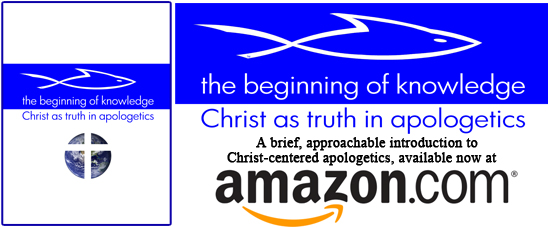 _____________________________________________________
_____________________________________________________
Apathetic Christianity: The Zombie Religion of American Churchianity explores the tragic true horror story of all-American dead religion masquerading as Christianity:
_____________________________________________________
On Education is a compilation of some of the most provocative and compelling Fire Breathing Christian articles on the subject of children’s education:
_____________________________________________________
There Is No “God-Given Right” To Worship False Gods is a compilation of some of the most provocative Fire Breathing Christian articles on the subject of America’s embrace of a satanic approach to religious liberty:
_____________________________________________________
Fire Breathing Christians – The Common Believer’s Call to Reformation, Revival, and Revolution is the book that first presented the FBC mission to apply the Gospel-fueled Great Commission in every realm of God’s creation:
_____________________________________________________
An alternate white cover version of Fire Breathing Christians is available:
_____________________________________________________
There is also an alternate black cover version of Fire Breathing Christians:
Finally, here are a few good intro/reminder links for those of you who are new to Fire Breathing Christian and curious about exactly what’s goin’ on ’round here:
What are you, some kind of [insert label here] or something?!
What’s with that shark-fishie graphic thing?
Intro to Fire: The Power and Purpose of the Common Believer
When the Bible gets hairy. (Or: Is it right for men to have long hair?)
And especially this one: Never forget that apart from God’s grace you and I are complete morons.
Thank you for your support!





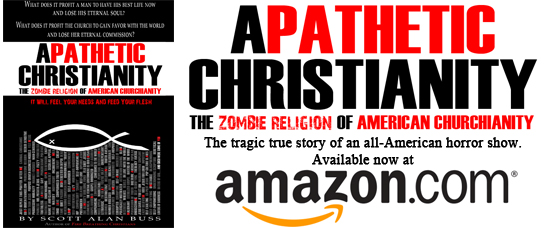

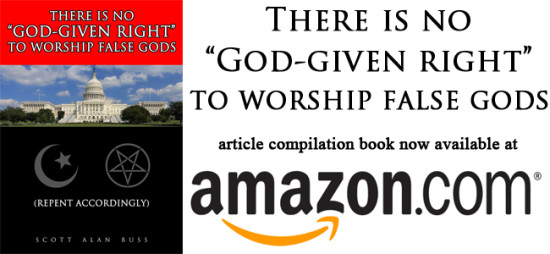
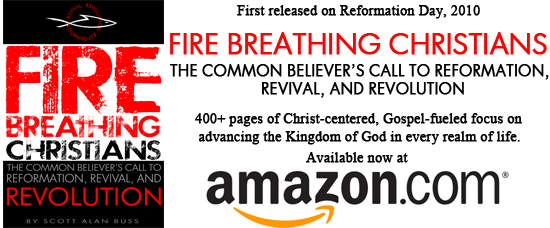


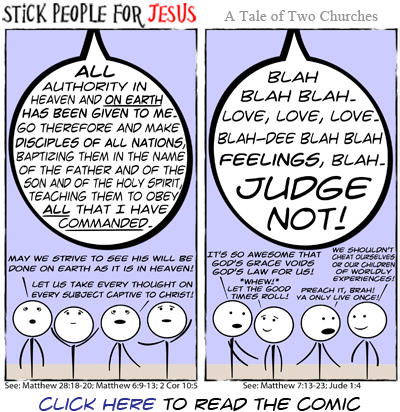
This is something our family has been struggling with for several years. We have been without a church home for over four years now, despite trying many churches, and even moving across the country. It's gotten to the point that sometimes we feel like giving up. It should not be so difficult to find a part of God's family that wants to follow Him, and only Him, and not a pastor/former member's orthodoxy/obsession with seeker friendliness. As we've been doing deep studies about various subjects in the Bible, and coming up with very different conclusions than we were raised with, when we questioned why such things were taught, when they contradict the Bible, we were told we were foolish children who needed to get our heads on straight, or all but attacked as heretics. We live next door to an old church, but do not attend because of flagrantly unBiblical teaching. So where do we go, when we can't find other Christians? We are lonely for Christian fellowship.